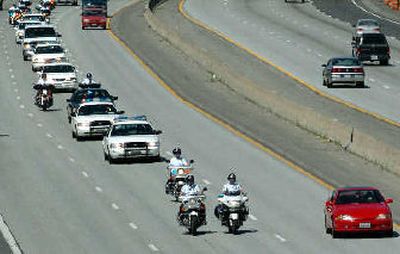‘Good to be home’

Coeur d’Alene police Officer Mike Kralicek received a hero’s welcome Wednesday when he rolled off a commercial airplane in his wheelchair into a receiving line of fellow officers at Spokane International Airport.
The officers from several police agencies, as well as passengers who were either disembarking or waiting for their flights, burst into applause as he approached.
“Good to be home,” Kralicek said as family members loaded him onto a wheelchair lift in their van for the drive to Coeur d’Alene. During the drive, the van was flanked by officers on motorcycles and in police cruisers.
Kralicek spent the last five months in a rehabilitation hospital in Englewood, Colo., recovering from a gunshot wound he sustained in the line of duty.
Kralicek was shot Dec. 28, 2004, when he went to a Hayden residence to help two Kootenai County sheriff’s deputies with an arrest. The suspect, 39-year-old Michael Madonna, broke free from officers, ran into his house, and grabbed a handgun.
When he bolted, Kralicek and Deputy Justin Bangs chased him. Bangs tripped on the stairs into the house, and Madonna turned and shot Kralicek, according to an investigation of the incident.
Kralicek held a Taser, but never unholstered his gun.
Bangs was then backed up by Deputy Kevin Smart, and in the ensuing hail of gunfire, Madonna was shot and killed.
The bullet that hit Kralicek shattered his lower jaw and severed his carotid artery, and the bullet fragments damaged his spinal cord. The loss of blood caused a stroke, according to family friend and former Coeur d’Alene police Lt. Don Jiran.
Kralicek initially was in a coma, and doctors had doubts about his recovery. He isn’t yet walking, but he is regaining some use of his limbs and speaks clearly, although one side of his face sags from the effects of the stroke.
“The man has really astonished a lot of people, the medical field as well,” Jiran said. “He and his wife have worked so hard. He’s going to pull something out of the hat. He’s not done yet.”
At a press conference upon his return to Coeur d’Alene, where he was flanked by his wife and two daughters, Kralicek said that he doesn’t really remember anything about that evening more than six months ago, except photographing a sign that was damaged allegedly during Madonna’s reckless driving earlier in the evening.
“When I first got out of here and woke up, I remember having horrible nightmares,” he said. “I couldn’t remember what they were about. … I knew something bad had happened, but I didn’t know what it was.”
He said he hasn’t thought a lot about Madonna.
“I’m not glad he died, but I’m glad he didn’t have to go through the rehab I went through, because I don’t think most people could survive it anyway,” he said. “It’s pretty tough, a lot of pain. I wouldn’t wish it on anybody.”
Kralicek’s rehabilitation, a lot of which consists of stretching his limbs beyond their limits, will continue at home.
When asked what he planned to do first when he got home, Kralicek answered, “Sleep.” Later, he plans to barbecue some pork ribs and corn on the cob.
As for long-term goals, Kralicek was hesitant, saying, “I don’t even know what I can do yet. … The other day I surprised myself. I held up a can of soda with a straw to take a drink by myself. That was pretty good.
“The rest of it, we have to wait and see.”
Coeur d’Alene Mayor Sandi Bloem was at the news conference, and later said it was difficult to put into words her reaction when she saw Kralicek.
“I don’t think a lot of us thought this day would happen at first,” she said. “But I think we forgot what Mike is made of. No doubt attitude, strength, good humor and a will to fight made this happen.”
Kralicek remains on the police department payroll for the time being, Chief Wendy Carpenter said, even though his future at the department remains uncertain.
“We’re just taking it one day at a time,” she said. “Hopefully he’ll just walk in one day and put on the uniform like it’s another day at the office.”
Carpenter said the last time a Coeur d’Alene police officer was shot was in the ‘40s, and it was in the leg.
Kralicek expressed gratitude for the outpouring of support he received from fellow officers, the community and the Denver Police Department. Denver police Chief Gerald Whitman presented a Purple Heart medal to Kralicek last week.
Contacted by phone Wednesday, Whitman said the medal was for “the devastating injuries he sustained in that ambush,” and also for his courageous recovery.
“The heroism he showed here in his recovery efforts was amazing,” he said.
As Kralicek rode toward Coeur d’Alene in the midst of the flashing blue, red and yellow lights of the motorcade, he heard a familiar sound from the police radio.
“K57 Central,” said the dispatcher, using a call number that had been silent for more than six months.
When Kralicek answered, he said, the message to him was, “Welcome home.”